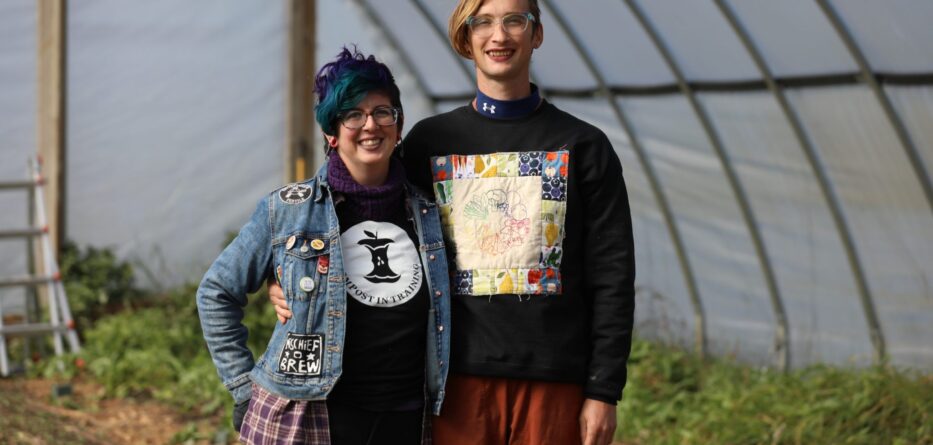Shannon and Eve Mingalone avow that their farmers market booth is “very gay.”
They hang strings of pride flags and sell rainbow stickers to help pay for gender-affirming care, like hormone replacement therapy, for Eve.
Sometimes, when parents and their teenagers pass the booth, the adults glance, then speed ahead. The kids pause for a second look. Shannon, 34, hopes it means something for them to see LGBTQ professionals out and succeeding.
People often share stories. The middle-aged woman who confided that her daughter is transgender. The teen who stood in the middle of the Mingalones’ booth and said, “This makes me feel safe.”
“That means everything to me,” Shannon said.
Now in their second season, she and Eve, 35, grow more than 45 varieties of vegetables at their business, Ramshackle Farm, in Harvard, Illinois.
Lettuces and Asian greens emerge on stacks of hydroponic troughs and spinach in a warm hoop house. Outside, Shannon and Eve tend to arugula, broccoli, peas and radishes using intensive planting and heavy rotation techniques – never pesticides or synthetic fertilizer.
Their operation is an exception to the sprawling corn and bean fields that dominate the landscape. Shannon and Eve work to feed people, not livestock or cars.
Shannon wears her politics on her coveralls. Her favorite jean jacket includes patches that declare “End monoculture” and “Save the earth. Bankrupt a corporation.”
The Mingalones are among a multitude of LGBTQ farmers who draw connections between their identities and agriculture, including their adoption of sustainable practices.
“We’re not just raising food,” Shannon said. “We are creating safe spaces for people.”
Like many, they used to have a specific image of a “typical farmer:” white, male, heterosexual, Christian and conservative. Excluded from that vision – or perhaps myth – is a space for them.
So they are creating one.
The presence of LGBTQ people in agriculture challenges stereotypes of who can, or should be, interested in farming. But the community is not a monolith, interviews with 16 Midwestern LGBTQ producers indicate. Some use restorative techniques in hopes of reducing environmental destruction and social inequity. Others run conventional operations, which industry representatives and policymakers say are key to feeding the world’s growing population.
Nonetheless, as LGBTQ farmers navigate common hurdles, ranging from land inaccessibility to federal lending restrictions to social isolation, they rely on creativity and resilience to survive, much like they do in other arenas of their lives.
USDA doesn’t count LGBTQ farmers
No definitive figures measure how many LGBTQ people farm in America. The U.S. Department of Agriculture asks respondents to identify their sex in its five-year censuses, not their sexual orientation or gender identity.
But the department is considering adding those questions to the 2027 Census of Agriculture. It conducted a pilot study in late 2021 to gauge whether their inclusion would affect response rates.
Responses decreased significantly when the questions were inserted, despite the survey’s confidentiality. The study lacked possible explanations for the findings.
But when word of the survey reached U.S. Sen. Josh Hawley, R-Mo., he accused the USDA and President Joe Biden of advancing a “woke agenda.” Hawley claimed in a tweet that a farmer sent him a copy of the document. The lawmaker questioned, facetiously, the relevance of “such important” questions to the farming profession.
The National Young Farmers Coalition likewise encountered pushback from outside of the LGBTQ community to a survey that included similar demographic questions.
But a failure to acquire demographic information about LGBTQ people prevents improvements to services, said Katie Dentzman, a rural sociology and public policy assistant professor at Iowa State University.
“If you’re completely unaware that these people are out there, then their issues are completely being ignored,” she said. “In a way, that is perpetuating violence in a system.”
Dentzman jimmied a statistical workaround using the USDA’s 2017 census, finding that 8,302 farms were overseen by men married to men and 3,550 by women married to women. That was about 1.2% of all dually run farms nationwide.
Dentzman found that many same-sex couples farmed conventionally. But same-sex married men were more likely to have organic land and grow products intended for human consumption than farms run by men married to women. Likewise, women married to women more often engaged in alternative farming practices like intensive grazing and the production of value-added products.
Might LGBTQ people’s unique vantage draw them to sustainable farming?
It’s possible, Dentzman said, but as other sociologists have proposed, the economic and social disadvantages queer people face also might funnel them into alternative agriculture. That is, they lack the expansive resources and capital necessary to farm conventionally.
Statistically, LGBTQ people experience higher rates of poverty and food insecurity compared to non-LGBTQ people. They also earn less dollar-for-dollar and disproportionately experience homelessness.
Then add the upfront costs of farming.
Land access remains a top obstacle to entering agriculture, and attempting to do so without the backing of family can be a Herculean task.
Fifty-nine percent of respondents to the 2022 National Young Farmer Survey said finding affordable farmland to purchase is very or extremely challenging, while 45% said the same of finding any farmland at all.
Meanwhile, the cost of cropland is rising nationwide.
Corbin Scholz, 27, operates Rainbow Roots, an organic farm “rooted in queerness” on 6 acres of rented land north of Iowa City, Iowa. She does not come from a farm family and works two other jobs to support herself.
Scholz’s lease expires after the 2024 growing season and she doesn’t know whether she will be able to renew.
“I’m not sure I’ll be able to ever afford a farm,” Scholz said, “and moving everything I’ve built to another one-to-five-year lease really limits my growth opportunity.”
Bennet Goldstein wrote this article for Wisconsin Watch. Broadcast version by Mike Moen for Wisconsin News Connection reporting for the Wisconsin Watch-Public News Service Collaboration






